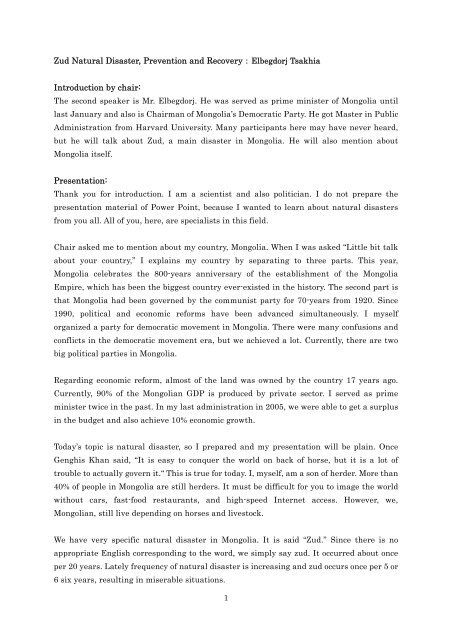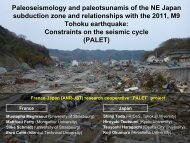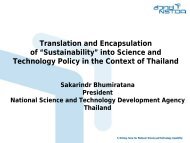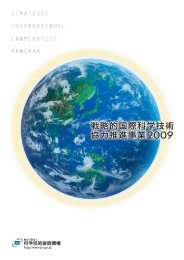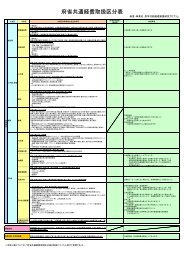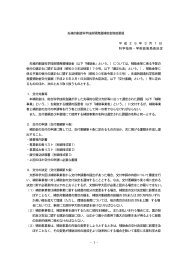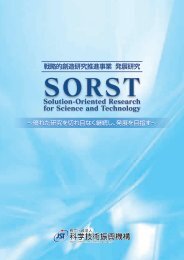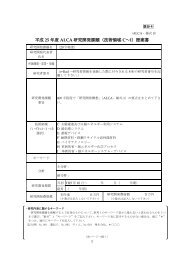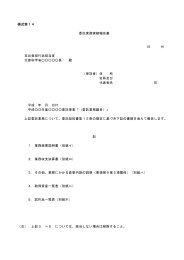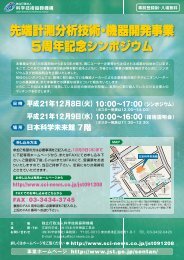Zud Natural Disaster, Prevention and Recovery:Elbegdorj Tsakhia ...
Zud Natural Disaster, Prevention and Recovery:Elbegdorj Tsakhia ...
Zud Natural Disaster, Prevention and Recovery:Elbegdorj Tsakhia ...
You also want an ePaper? Increase the reach of your titles
YUMPU automatically turns print PDFs into web optimized ePapers that Google loves.
<strong>Zud</strong> <strong>Natural</strong> <strong>Disaster</strong>, <strong>Prevention</strong> <strong>and</strong> Recovery:Elbegdorj <strong>Tsakhia</strong><br />
Introduction by chair:<br />
The second speaker is Mr. Elbegdorj. He was served as prime minister of Mongolia until<br />
last January <strong>and</strong> also is Chairman of Mongolia’s Democratic Party. He got Master in Public<br />
Administration from Harvard University. Many participants here may have never heard,<br />
but he will talk about <strong>Zud</strong>, a main disaster in Mongolia. He will also mention about<br />
Mongolia itself.<br />
Presentation:<br />
Thank you for introduction. I am a scientist <strong>and</strong> also politician. I do not prepare the<br />
presentation material of Power Point, because I wanted to learn about natural disasters<br />
from you all. All of you, here, are specialists in this field.<br />
Chair asked me to mention about my country, Mongolia. When I was asked “Little bit talk<br />
about your country,” I explains my country by separating to three parts. This year,<br />
Mongolia celebrates the 800-years anniversary of the establishment of the Mongolia<br />
Empire, which has been the biggest country ever-existed in the history. The second part is<br />
that Mongolia had been governed by the communist party for 70-years from 1920. Since<br />
1990, political <strong>and</strong> economic reforms have been advanced simultaneously. I myself<br />
organized a party for democratic movement in Mongolia. There were many confusions <strong>and</strong><br />
conflicts in the democratic movement era, but we achieved a lot. Currently, there are two<br />
big political parties in Mongolia.<br />
Regarding economic reform, almost of the l<strong>and</strong> was owned by the country 17 years ago.<br />
Currently, 90% of the Mongolian GDP is produced by private sector. I served as prime<br />
minister twice in the past. In my last administration in 2005, we were able to get a surplus<br />
in the budget <strong>and</strong> also achieve 10% economic growth.<br />
Today’s topic is natural disaster, so I prepared <strong>and</strong> my presentation will be plain. Once<br />
Genghis Khan said, “It is easy to conquer the world on back of horse, but it is a lot of<br />
trouble to actually govern it.“ This is true for today. I, myself, am a son of herder. More than<br />
40% of people in Mongolia are still herders. It must be difficult for you to image the world<br />
without cars, fast-food restaurants, <strong>and</strong> high-speed Internet access. However, we,<br />
Mongolian, still live depending on horses <strong>and</strong> livestock.<br />
We have very specific natural disaster in Mongolia. It is said “<strong>Zud</strong>.” Since there is no<br />
appropriate English corresponding to the word, we simply say zud. It occurred about once<br />
per 20 years. Lately frequency of natural disaster is increasing <strong>and</strong> zud occurs once per 5 or<br />
6 six years, resulting in miserable situations.<br />
1
There are three types of <strong>Zud</strong>. The heavy snowfall is called the “white zud.” The second is<br />
the formation of an impenetrable ice layer over pasture thus preventing animals from<br />
grazing. The third is called the “black zud” which is lack of grazing pasture in long harsh<br />
winter following summer drought. The <strong>Zud</strong> combining these three types of zud occurred<br />
from 1999 to 2003 for three years in succession. Population of Mongolia is 2.7 millions,<br />
while livestock is 20 millions. We lost 1,000 livestock in three years. Mongolian herders live<br />
with livestock, which actually served as food <strong>and</strong> transportation tools. Loss of livestock<br />
means lost of everything to live.<br />
The other big problem is a traditional lifestyle of Mongolian. Usually, Mongolian families<br />
live far away to each other because they need huge space to live. They also move constantly,<br />
so communication is difficult.<br />
I think that Mongolian is now unlucky. We lost 800 lakes <strong>and</strong> rivers in the past five years in<br />
Mongolia. <strong>Natural</strong> disaster is not only problem in nature, but social problem. When people<br />
lose everything <strong>and</strong> get poor, they get back to nature to hunt <strong>and</strong> cut trees, which further<br />
worsens situations.<br />
In Mongolia, we are now experiencing mining boom. Investment is good <strong>and</strong> many<br />
companies come to Mongolia. But if they dig everything, the nature will be destroyed, thus<br />
causing loss of lakes <strong>and</strong> river. By which, climate will change to become dry, causing<br />
drought.<br />
Mongolian yellow s<strong>and</strong> is famous, too. Genghis Khan could not conquer Japan, but yellow<br />
s<strong>and</strong> comes over to Japan, causing problem in Japan. I frequently talk to my friends,<br />
“<strong>Natural</strong> disasters have no border.” It is common problem for all of us. In this sense, theme<br />
of today’s session is timely. Partnership among countries to work together is more effective<br />
than one country takes action alone. I believe that momentum of mutual-assistance will<br />
rise through conferences like this.<br />
I think that we are lucky generation. We have now new technologies never imagined <strong>and</strong><br />
further a number of new technologies are being realized. When I was child, it took two days<br />
for my father to ride a horse to inform zud occurrence to local community or government.<br />
But currently people can communicate with cellular phones with those thous<strong>and</strong>s of<br />
kilometers away <strong>and</strong> know price of cashmere on back of horse every morning. People can<br />
inform occurrence of disaster within two minutes.<br />
Technology is splendid, but expensive. For example, one cellular phone equals to 3 to 4<br />
horses. I think that leaders of developed countries should pay more attention to developing<br />
2
countries. Cooperation between countries is necessary. Funds are necessary to receive<br />
benefits of technological advancement <strong>and</strong> to educate how to utilize technologies. I think<br />
that some foundation is needed in our region.<br />
Mongolia is a small country. But disasters strike it on large-scale, sacrificing everything. I<br />
think forum like this provides a meaningful opportunity to learn why natural disasters<br />
happen. We, Mongolia, will make further efforts, learn about natural disasters, <strong>and</strong> deepen<br />
partnership with other countries.<br />
Lastly, I repeat that today I come here to learn from you, not teach something to you. I wish<br />
that I will work with you together.<br />
Thank you very much.<br />
Question <strong>and</strong> Answer:<br />
Q: As I heard that zud is harsh to kill people, does it cause significant social impact, for<br />
example, economic impact by loss of livestock?<br />
A: When <strong>Zud</strong> hits, almost sheep or goat die. If people lost them, they have to migrate to<br />
towns. This induces new problems such as unemployment, crime, <strong>and</strong> school. <strong>Zud</strong> causes<br />
big social problems in Mongolia, not limited to herders. If one-thirds of livestock are lost,<br />
one-thirds of herders have to settle down. In Mongolia, there are no big towns or cities. The<br />
country is composed of small counties, which can not sustain or help all the damaged<br />
people. Then people move to Capital to increase population <strong>and</strong> cause new problems. The<br />
Mongolian government reserved special foundation for zud. Since zud occurs locally, the<br />
government buys livestock in other areas <strong>and</strong> gives those to herders in damaged-area. This<br />
foundation mitigates damage to a degree, but it takes 5 or 10 years to recover all the<br />
damages. Partnership is not an assistance covering one winter, but should be long-term<br />
help. I think that permanent structure must be established.<br />
3


